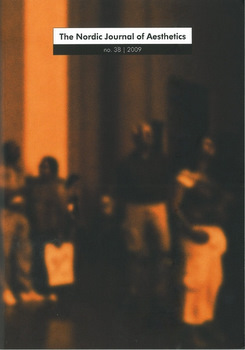Pragmatist Aesthetics, the New Literacy, and Popular Culture. A Response to Stefán Snævarr
DOI:
https://doi.org/10.7146/nja.v20i38.2815Abstract
The article is a critical response to Stefán Snævarr’s “Pragmatism and Popular Culture: Shusterman, Popular Art, and the Challenge of Visuality.”In its first part, I attempt to prove that several of Snævarr’s claims about popular culture and new media, which form the basic premises of his diagnosis of the alleged intellectual decline of the West, are either dubious or wrong. Moreover, in the context of this diagnosis, Snævarr levels some serious accusations against Richard Shusterman’s theory of popular culture, which, I believe, are ungrounded and do not do justice to the latter’s approach. Henceforth, the remainder of the article is devoted to explaining in which aspects Snævarr’s interpretation of Richard Shusterman’s theory is misguided.Downloads
How to Cite
Małecki, W. (2009). Pragmatist Aesthetics, the New Literacy, and Popular Culture. A Response to Stefán Snævarr. The Nordic Journal of Aesthetics, 20(38). https://doi.org/10.7146/nja.v20i38.2815
Issue
Section
Articles
License
Authors who publish with this journal agree to the following terms:
- Authors retain copyright and grant the journal right of first publication with the work simultaneously licensed under a Creative Commons Attribution License that allows others to share the work with an acknowledgement of the work's authorship and initial publication in this journal.
- Authors are able to enter into separate, additional contractual arrangements for the non-exclusive distribution of the journal's published version of the work (e.g., post it to an institutional repository or publish it in a book), with an acknowledgement of its initial publication in this journal.
- Authors are permitted and encouraged to post their work online (e.g., in institutional repositories or on their website) prior to and during the submission process, as it can lead to productive exchanges, as well as earlier and greater citation of published work (See The Effect of Open Access).




